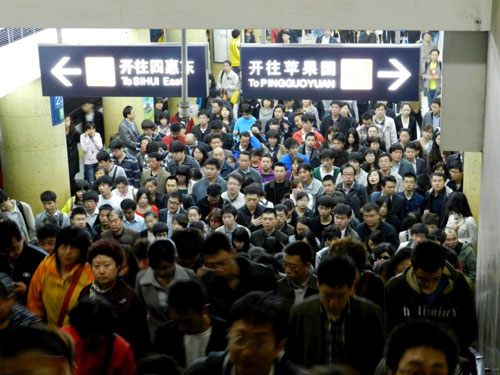|

People crowd a subway station in Beijing, April 18, 2011. [Photo/Xinhua]
|
Beijing plans to redo its city planning scheme in 2013, The Beijing News reported. The current scheme was set in 2005 for the 2004-2020 period.
According to Beijing Municipal Commission of Urban Planning, the 6th national census showed that Beijing's population is 19.6 million, surpassing the expected population of 18 million in 2020. In 2009, Beijing's per capita GDP had surpassed the projected data of $10,000 in 2020. Population and per capita GDP are two key indexes for city planning.
Tu Qiyu, an urban studies expert at the Shanghai Academy of Social Sciences, said that the calculation of population is the basis for city planning. "The population is a decisive factor in housing and traffic construction," Tu said.
For Beijing, the population's rapid growth is a significant transformation.
Huang Yan, director of Beijing Municipal Commission of Urban Planning, said during a seminar on developmental problems in Beijing's population and industries that more research on population would be carried out for the new city planning scheme.
The developmental mode of Beijing should be improved, as the population continues to grow, demanding higher and higher costs and city life becomes low-efficient.
The concept of "Beijing,Tianjin and Hebei province Zone" will be highlighted.
Starting in 2011, Beijing and Hebei province worked together on some city planning, and the plan includes Beijing, Tianjin, satellite cities of Beijing and other nearby cities in Hebei province.
Zhang Zhixin, an associate professor at the public management department, Capital University of Economics and Business, said that Beijing would have difficulties in solving its problems without cooperation from Tianjin and Hebei province.
Zhang also said that the problems of Beijing's satellite cities should be paid special attention. Currently some satellite cities are only a place where people live but without any office buildings, and because of that, large groups of people rush to downtown areas in the morning for work and rush back home after work, creating more pressure on the traffic systems.
Chinadaily.com.cn
|